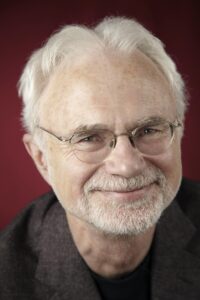FEATURE | By Bret Bradigan
Sounds Like Home

Rhiannon Giddens, photo by Ebru Ildiz
A lot has happened since Barbara Hannigan’s conducting baton waved the 2019 Ojai Music Festival to a close in a program featuring the music of Igor Stravinsky, Haydn and Gershwin. But the idea of Ojai as a place where three such disparate composers can be combined into a harmonious whole lived on through the pandemic.
John Adams — who himself turns 75 early next year — returns as Music Director to curate this year’s 75th annual Ojai Music Festival. It’s been 28 years since his first appearance as music director. For this auspicious anniversary, he has deliberately sought out
younger composers, performers and musicians who can give audiences insight into what’s coming next for contemporary music.
Libbey Bowl is a stage steeped in such forward-looking performances. Adams made his own reputation by turning from formalism and academic modernism and opening it up to a more human, expressive language that reflects a wide variety of influences, much like the best of America itself.
Adams has mentored an entire generation of composers — Gabriela Ortiz, Gabriella Smith, Timo Andres and Carlos Simon among them. While he’s bringing attention to this vanguard of new composers, festival artistic director Ara Guzelimian convinced him that the festival goers — many of whom have been listening to Adams’ explorations of musical styles for decades — would love to hear some of his own important compositions.
The theme of “coming home” for the 75th Ojai Music Festival harmonizes especially with featured performer Rhiannon Giddens. She and her partner Francesco Turrisi recently released “They’re Calling Me Me Home,” a pandemic-era project that covers several centuries of music, all about home — whether finding it, losing it, or appreciating it.
Making their Ojai debuts, and perhaps finding a new home, will be violinist Miranda Cuckson, Icelandic pianist Víkingur Ólafsson and the Grammy-Award winning Attacca Quartet. Closing out the festival will be Adams conducting the Los Angeles Chamber Orchestra, with Giddens singing, Vîkingur Ølafsson on the piano and a world premiere work by Gabriela Ortiz, as well as works by Mozart, Carlos Simon and Adams himself.
 Adams, who won the Pulitzer Prize for music with his 2003 work, “On the Transmigration of Souls,” commemorating the victims of the 9-11 tragedy, came of age during the strict modernism of Pierre Boulez, but found himself liberated by the free-form explorations of John Cage and Steve Reich, and has collaborated with the dynamic director Peter Sellars on his major operas, first with “Nixon in China,” and “Doctor Atomic” about nuclear physicist Robert J. Oppenheimer. All of these composers have shared or been heard from the Ojai stage at one time or another.
Adams, who won the Pulitzer Prize for music with his 2003 work, “On the Transmigration of Souls,” commemorating the victims of the 9-11 tragedy, came of age during the strict modernism of Pierre Boulez, but found himself liberated by the free-form explorations of John Cage and Steve Reich, and has collaborated with the dynamic director Peter Sellars on his major operas, first with “Nixon in China,” and “Doctor Atomic” about nuclear physicist Robert J. Oppenheimer. All of these composers have shared or been heard from the Ojai stage at one time or another.
The festival opens Thursday, Sept. 16 with an evening concert featuring Miranda Cuckson on violin joining the Attaca Quartet on Stravinsky’s “Elegie.” The Attaca Quartet returns the next morning with Rhiannon Giddens with a selection of works by Adams’ “Book of Alleged Dances.” The repertoire also includes Giddens’ original songs, such as the haunting “At the Purchasers’ Option,” inspired by a newspaper advertisement in which a 19-year-old woman was sold, but with her nine-month-old daughter at the purchaser’s option.
John Adams takes up the conductor’s baton Friday evening to conduct the Ojai Festival Orchestra in a repertoire of festival favorites including Debussy, past music director Esa-Pekka Salonen, and a work by rising star Timo Andres, called “Running Theme.”
Someone else keeping busy during the festival will be Chumash elder and Ojai community leader Julie Tumamait-Stenslie, who will be sharing native stories Friday morning, and blessing performances at Libbey Bowl throughout the festival.
This year’s festival was postponed three months to allow in-person performances with lower risk of spreading coronavirus, though the festival kept faith with its usual second-weekend of June schedule with a series of pop-up performances around town. While the world hit the giant pause button these past pandemic months, many artists used the time productively.
Known for her pure, clear voice and virtuosity on the banjo (as well as her acting chops on the hit show “Nashville”), Giddens wouldn’t seem at first glance an obvious choice to sign on as a featured performer for the world’s leading festival of contemporary and classical music. But David Bither, the head of Nonesuch Records, had a different idea.
“If David asks me to do something, I will do it,” said Giddens, interviewed on the Ojai podcast via phone from her home in Dublin, Ireland. “He’s been such an important part of my journey as an artist, when he said, ‘Would you consider this festival,’ I said, ‘Sure.’ There’s not much I wouldn’t do for David.”
His predecessor at Nonesuch, David Hurwitz, an accomplished amateur pianist and Ojai Festival enthusiast, will be the inspiration for the Sunday morning concert, with Timo Andres playing pieces by artists whose careers Hurwitz has advocated, including Philip Glass, Steve Reich, Laurie Anderson, Louis Andriesson and Donnacha Dennehy, as well as Adams and Andres themselves.
Though Giddens has never yet been to Ojai, she’s indirectly experienced the area through her popular Aria Code podcast, where she calls upon her past as an opera singer to tell the stories behind the great arias. One recent episode included her analysis of Stravinsky’s “Rake’s Progress,” which was performed at the festival in 2019. Stravinsky is considered by many to be the festival’s guiding spirit. She drew parallels between Ann Trulove’s “No Word From Tom” and Johnny Cash’s road romance with June Carter Cash, while his wife at the time, Vivian Liberto Cash, lamented his absence from her home high on the hill above Casitas Springs.
The Festival finale brings together Adams conducting the prestigious Los Angeles Chamber Orchestra, Olafsson on the piano, Giddens singing for a program spanning centuries of works by Mozart, Carlos Simon, Gabriela Ortiz, and Adams himself.
For more information on the festival and Rhiannon Giddens, check out Ojai: Talk of the Town episode 70. A few excerpts:
Giddens on the Ojai Festival:
It’s right up my alley — the breadth of it, the ability to do all these things in one place, it’s a no-brainer for me. I love festivals that have different things all around in the same sort of atmosphere, like Big Ears (Festival) in Knoxville. I really wish there were more festivals like that.
Coming Out of the Pandemic:
After year-and-a-half, I’m ready to relinquish all the engineering and all of it and start collaborating. It’s been rough this pandemic doing it all ourselves, I can’t wait to get back together working with a team.
Wilmington, North Carolina in 1898, Tulsa, Oklahoma in 1921 & “The Violently Unremembered:”
There’s always been pushback about telling the truth of history. (There’s people that) they just don’t want them to know. That’s the threat of black economic prosperity — it’s too much for a certain segment of white America. We’ve been shown that time and again, that it must be destroyed by whatever means necessary. We can’t tell the story of America without telling all the pieces. Anyone surprised by what’s happened at the Capitol (on January 6) hasn’t read enough history.”
The Black Influence on Country Music:
The Carter family? They weren’t self-taught — a large influence (on them) was Leslie Riddle. He went around with AC Carter and broke down the songs … he imparted some of the way he played the guitar. The whitest of the white? That style is held up as white Appalachia, but there’s a black thread runs through that becomes forgotten. So many places in country music, where it’s invisible — we wouldn’t have the Carter sound without Lesley Riddle. How we get erased, it never stops to astound me.
Her Introduction to Music:
I got into music through dancing — contra dancing. Those English country dances, I became a big fan. (When I went) back home to North Carolina, I heard lot of old time music, banjo and fiddle — and learned of the African connection as a living link to Frank Johnson (a famous, unjustly neglected string band leader of the 19th century). I learned how huge the black string bands were — how instrumental to entertainment they were — and how little they were remembered. You got to win the war of words, or you lose a whole generation.
On Winning a MacArthur Fellow
‘Genius’ Grant:
Definitely was, a time when I was like “Oh my God, what am I doing? I’m not like doing Kendrick Lamar. I was feeling the drain of trying to keep a band out there and do all these appearances and have a mission to what I’m doing. So when I got that phone call — the money was amazing — but what hit me was the validation, it allowed me to do it in ways where I’m not having to struggle so much, to do projects that were more … well, I’ve never taken projects just for the money, but could never afford to do.
Like the opera — (“Omar” — written about Omar Bin Said, an enslaved Muslim man whose 1831 autobiography was written in Arabic), that’s something that became possible.


Leave A Comment